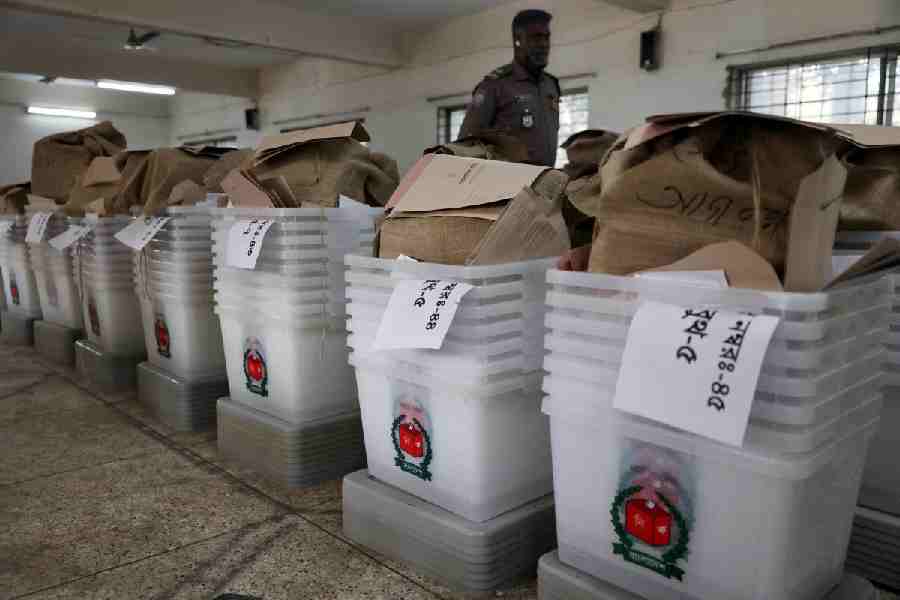
Kuka Parray's elder son Wasim at his graveside in Hajin. Picture by Sankarshan Thakur
The evil that men do lives after them; the good is oft interred with their bones - Julius Caesar , William Shakespeare
Hajin (North Kashmir), Dec. 4: Where Kuka Parray is interred an argument still rings between good and evil, between what he was and he was not.
Who'd argue with a daughter whose eyes moisten when she points in the direction of Parray's grave and lets out a sigh: ' Meray Papa... my father.'
Who'd argue with the fathers and mothers of those that Parray's men wantonly killed - 'that traitor who preyed upon his own'.
Not a blade of grass springs on Parray's graveside, much less a blossom; and birds don't alight to sing. For a cage it is where he lies, a padlocked enclosure of mortar and wrought iron filigree erected on his front lawn, a stained general in his cold labyrinth.
He wouldn't be safe elsewhere in a place under open skies. He denied himself the eternal liberties the way he lived and died.
Between folk singer and folk terror, Kuka Parray became a blistered chapter in Kashmir's contemporary tales, a chapter nobody fondly recalls but nobody would wish to forget in this neck of the woods.
As we drove towards Hajin, about 50 kilometres north of Srinagar towards Bandipore, through chinar and poplar plantations, stripped bare by winter and etched finely into the skies, driver Majeed let out a cautionary whistle to himself.
I asked what made him, and he said, ' Main tou ladka hi thha, lekin Kuka Parray ke naam se hi rooh kaanpti thhi, koi nahin aata thha iss raastey (I was only a boy then, but the mere mention of Kuka Parray sent a chill down our souls, nobody used to come this way).'
It was to be Majeed's first time in Hajin, and he drove with Parray's imagined apparitions haunting him.
'He was a horror, a horrible man, he killed so many, destroyed so many families, inflicted such atrocity in this area. Do you really want to go there?'
How many may Kuka Parray's Ikhwan-ul-Musalmoon vigilantes have killed during their time? The beauty and the sadness is there exists no record.
Kuka Parray was designed and brought on stage so his presence there could be off the record. Parray and his Ikhwani gangsters were to be the stealth arm of the Indian state, a home-bred counter to Kashmiri insurgency at its peak in the mid-1990s.
They were hosted, trained, armed, then licensed to mayhem: kidnapping, extortion, torture, murder, unaccounted transgression by a band of unaccountable men. Nobody took responsibility for their deeds; when their horrors came to light the State enjoyed complete deniability: we have no role in this, it's militants fighting militants.
When Parray was himself shot dead, mid-noon after inaugurating a cricket tourney close to home in September 2003, responsibility was swiftly attached but never owned: Jaish-e-Mohammed gunmen took Parray out, the government said, but nobody to date is quite sure.
Before that, though, Parray had partially achieved what he had covertly been tasked to: neutralise militant groups enough so elections could be held, the first after the aazaadi insurrection of 1989-90.
The 1996 polls were conducted at the end of bayonets - the army's and Parray's -but they were conducted, and since then they have never stopped being held in six-yearly cycles.
That was Parray's dubious connection to the return of a process that has begun to receive huge, even feisty, participation in the Valley - it also took a demon's hand to rekindle democracy where armed anarchy had come to reign.
It's a process Parray's younger son Imtiyaz has come to be part of today, as Congress candidate from Hajin; it's moot how far his father's stained legacy will take him. Part of his campaign he spent apologising for 'mistakes of the past', but Parray's past isn't easy to forget, much less forgive.
Parray himself, like Kay Kay Menon's Khurram in Vishal Bhardwaj's Haider, came elected to the Assembly as an Independent in 1996, essentially the beneficiary of a widespread and popular boycott.
But should you ask around, even in his native Hajin, people would tell you Khurram is too kindly a likeness of Parray, a man they had come to so despise they did not give his remains a community burial. That's why that tomb on the front lawn, Parray's eternal infamy.
It's what his children have come to most regret, their father's troubled legacy, that he never got his due credit.
'I used to hide who I was at school and university because they would say all kinds of things about Papa,' daughter Nusrat tells me, a morose air wimpled round her face.
'Papa was not a bad man, maybe some people around him did bad things, but not Papa, he wasn't a killer, he was my Papa.'
Nusrat wouldn't be photographed, but elder brother Wasim led me closer across the lawns towards the grave and took a pose. 'We have nothing to be ashamed of, whatever it was, my father bravely flew India's flag in these parts, fought India's battles. He died for India, and nobody recognised that. Lesser people have got the President's medal, nobody so much as came to bid him farewell.'
It must have dawned on Wasim, though, that nobody pins medals on soldiers that aren't given uniforms, and only proxy wars to wage. Any good Kuka Parray may have done lies interred unacknowledged, the evil lives after him.











